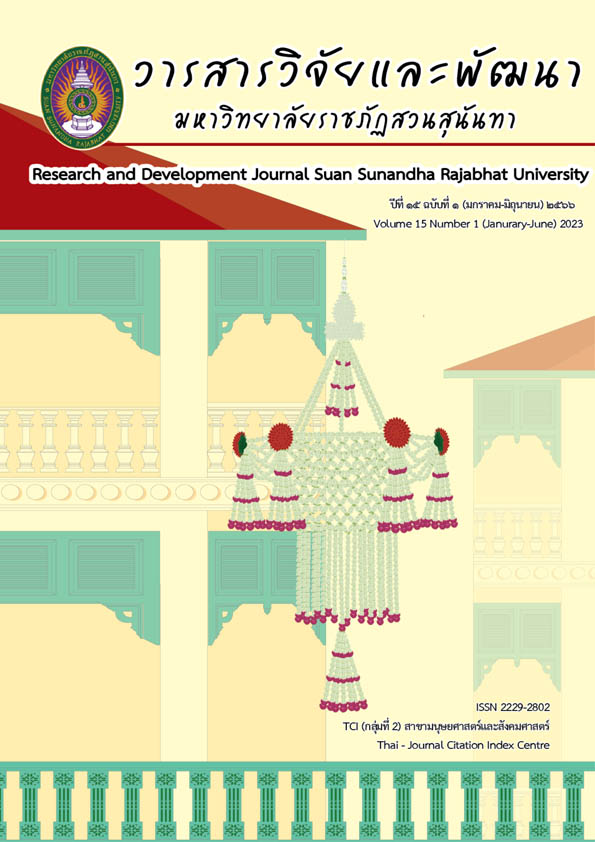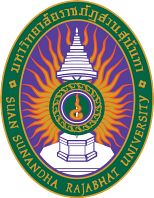Competency-based Learning Design: Concepts, Instructional Design and Learning Evaluation
Keywords:
Learning Design, Competency Based Learning, Competency Based Learning AssessmentAbstract
This article is intended to study the concept of competency-based learning (CBL), approach to the design of competency-based learning and competency-based learning evaluation. Competency-based learning management practices focus on combining both content and knowledge. Practical skills, attitudes, and attributes are necessary to achieve the desired competencies. Therefore, the design of competency-based learning management has changed the paradigm from content-based teaching to ability-based teaching, learning that combines knowledge across science, and paying attention to the learners' needs when making decisions about their learning experience. This is a way to create or apply knowledge and learners can demonstrate their own learning. For learning design to be consistent with competency-based learning management, instructors should design by selecting meaningful contexts and having a multidisciplinary approach.
Through cooperative learning and interactive learning, learners can choose to learn by discovering information through cognitive processes. It is important, that teachers design their learning to meet their individual learning needs. In designing learning activities, practice should be emphasized. (Performance) under the conditions (Condition) specified to meet the standards (Standard) according to the performance criteria (Performance Criteria) and have evidence of practice (Evidence), including assessment and examination, therefore learning design, and evaluating learning outcomes are based on competency-based learning management. In evaluating learning competency, it is an assessment of learners who demonstrate performance according to performance criteria (Performance Criteria) that indicate the proficiency (Mastery) of learners, so learners will receive feedback for developing competency. own in the process of evaluating the competency base, a variety of methods and assessment tools must be used as an assessment based on actual conditions, focusing on competency development (Assessment for Improvement), thus evaluating an assessment based on actual conditions (Authentic Assessment).
References
Eliot, L., & Susan, P. (2019). What is competency-based education? An updated definition. Vienna: The Aurora Institute.
Hong, W. (2012). An International study of the changing nature and role of school curricula: from transmitting content knowledge to developing students’ key competencies. Asia Pacific Educational Review, 13(1), 27-37.
Jantra, K. (n.d.). Competency-based education management. In A journal accompanying the meeting of the working group drafting the essence of basic education curricula development Basic Education Curriculum Development Committee, Lecturer of Social Studies, Religious and Cultural Subject Group. Bangkok: Chulalongkorn University Demonstration School, Secondary Division (In Thai).
Khammanee, T. (2019). 10 core competencies to make Thai children smart, knowledgeable, well-being, highly competent and socially conscious. Retrieved October 1, 2022, from http://site.ksp.or.th/content.php?site=library%20&SiteMenuID=4472&Action=view&Sys_Page=&Sys_PageSize=&DataID=2251.
Mkonongwa, L. M. (2018). Competency-based teaching and learning approach towards quality education. Retrieved October 1, 2022, from https://www.tenmet.org/wp-content/uploads/2018/12/Competency-based-teaching-and-learning-approach-towards-quality-education.pdf
O’Sullivan, N., & Burce, A. (2014). Teaching and learning in competency-based education. In The Fifth International Conference on e-Learning (eLearning-2014). Belgrade.
Office of the Education Council. (2019). Approaches to develop student competency basic education level. Nonthaburi: 21 Century.
Ra-Ngubtook. (2019). Thai Learners’ Key Competencies in a VUCA World. JOURNAL OF TEACHER PROFESSIONAL DEVELOPMENT, 1(1), 8-18 (In Thai).
Sereerat, B. (2021). The development of Competency Based Instructional Model :Combine Courses for Faculty of Education’ students Bansomdejchaopraya Rajabhat university. Journal of Educational Studies, 143-158 (In Thai).
Wongyai, W., & Patphol, M. (2019). Authentic competency–based assessment. Bangkok: Innovative Leaders center in Curriculum & Learning (In Thai).
Downloads
Published
How to Cite
Issue
Section
License
Copyright (c) 2023 Suan Sunandha Rajabhat University

This work is licensed under a Creative Commons Attribution-NonCommercial-NoDerivatives 4.0 International License.
บทความที่ได้รับการตีพิมพ์เป็นลิขสิทธิ์ของ สถาบันวิจัยและพัฒนา มหาวิทยาลัยราชภัฎสวนสุนันทา
ข้อความที่ปรากฏในบทความแต่ละเรื่องในวารสารวิชาการเล่มนี้เป็นความคิดเห็นส่วนตัวของผู้เขียนแต่ละท่านไม่เกี่ยวข้องกับมหาวิทยาลัยราชภัฎสวนสุนันทา และคณาจารย์ท่านอื่นๆในมหาวิทยาลัยฯ แต่อย่างใด ความรับผิดชอบองค์ประกอบทั้งหมดของบทความแต่ละเรื่องเป็นของผู้เขียนแต่ละท่าน หากมีความผิดพลาดใดๆ ผู้เขียนแต่ละท่านจะรับผิดชอบบทความของตนเองแต่ผู้เดียว






